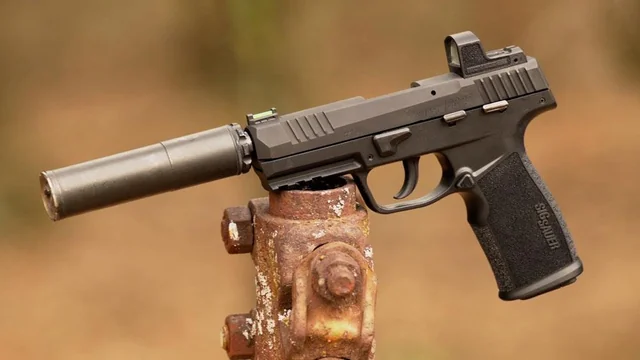The debate over gun control in the United States has long been a contentious issue, with lawmakers divided along party lines. The latest development in this ongoing discussion comes from Republican legislators, who have included a provision in their budget proposal to eliminate the federal tax on firearm silencers, also known as suppressors.
This move has reignited debates over gun safety, Second Amendment rights, and the role of suppressors in firearm use. Supporters argue that removing the tax will make silencers more accessible for lawful gun owners, while opponents warn that it could lead to increased risks to public safety.
Understanding the Current Tax on Silencers
Under the National Firearms Act (NFA) of 1934, silencers are classified as regulated firearms accessories, requiring buyers to pay a $200 tax stamp and undergo an extensive background check that can take several months. The process involves submitting fingerprints, obtaining approval from local law enforcement, and waiting for the Bureau of Alcohol, Tobacco, Firearms and Explosives (ATF) to process the application.
The $200 tax was implemented nearly a century ago as a way to discourage the use of silencers, which were associated with criminal activity during the Prohibition era. However, proponents of the Republican proposal argue that this tax is outdated and unfairly burdens legal gun owners.
Republican Argument: Removing Barriers for Law-Abiding Gun Owners
Republicans leading this initiative, including members of the House Freedom Caucus, contend that the tax and regulatory hurdles do little to enhance public safety. Instead, they argue that the current system makes it unnecessarily difficult for hunters, sport shooters, and self-defense advocates to obtain suppressors.
Key Points in Favor of Removing the Tax:
-
Hearing Protection – Silencers reduce noise pollution and protect shooters from long-term hearing damage. Many gun rights advocates argue that suppressors should be treated like other safety equipment, such as ear protection, rather than heavily restricted items.
-
Reducing Bureaucracy – The lengthy ATF approval process can take 6-12 months, discouraging many gun owners from legally acquiring suppressors. Eliminating the tax could streamline access for responsible users.
-
Economic Benefit – The suppressor industry has grown significantly, with manufacturers arguing that removing the tax would boost sales and create jobs in the firearms sector.
-
Misconceptions About Silencers – Contrary to Hollywood portrayals, suppressors do not make guns “silent.” They merely reduce the decibel level of gunshots, making them comparable to a jackhammer or chainsaw in noise level.
Democratic and Gun Control Advocates’ Concerns
Opponents of the Republican proposal, including gun control groups and many Democratic lawmakers, argue that removing the tax could make it easier for criminals to obtain silencers, potentially increasing dangers to law enforcement and the public.
Key Concerns Against the Proposal:
-
Public Safety Risks – Critics fear that easier access to suppressors could make it harder for people to recognize gunfire in public spaces, delaying emergency responses during shootings.
-
Law Enforcement Opposition – Organizations such as the Fraternal Order of Police (FOP) have expressed concerns that silencers could give criminals an advantage in shootings, making it harder for officers to locate active threats.
-
Lack of Evidence for Hearing Protection Claims – While silencers do reduce noise, opponents argue that standard ear protection is sufficient for most shooters and that the push for deregulation is more about expanding gun access than safety.
-
Potential for Increased Illegal Modifications – Some worry that removing restrictions could lead to more untraceable “homemade” suppressors, which are already a concern for law enforcement.
Legislative Prospects and Political Implications
The Republican budget proposal faces an uphill battle in a divided Congress. While the GOP controls the House, Democrats hold the Senate, making it unlikely that the provision will pass without significant compromise. However, the debate itself highlights the broader ideological divide on gun policy in America.
If successful, this move could set a precedent for further deregulation of firearm accessories, including potential changes to laws governing short-barreled rifles and other NFA-regulated items.
Conclusion: Balancing Rights and Safety
The Republican push to eliminate the silencer tax reflects a broader effort to reduce federal oversight on firearms, framing it as a matter of personal freedom and practical necessity for gun owners. However, gun control advocates see it as a dangerous relaxation of regulations that could have unintended consequences.
As the debate continues, the central question remains: Should silencers be treated as essential safety devices or as potential threats to public safety? The outcome of this legislative effort could shape future gun policy discussions for years to come.
For now, gun owners, manufacturers, and policymakers will be closely watching whether this provision gains traction—or if it becomes another flashpoint in America’s ongoing gun debate.



